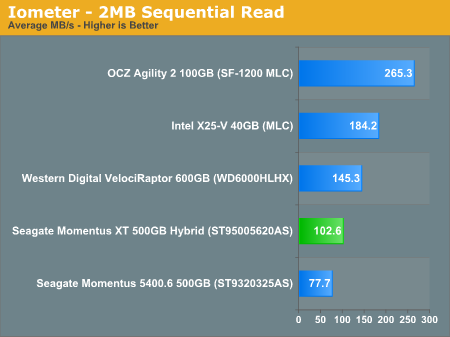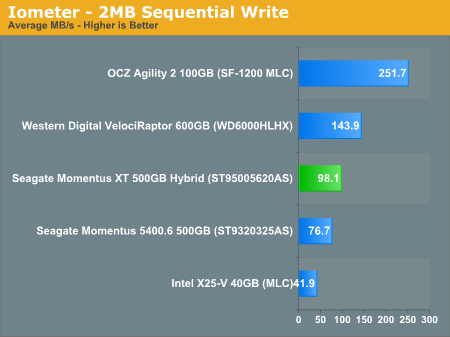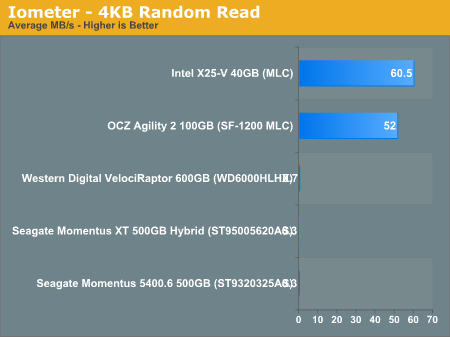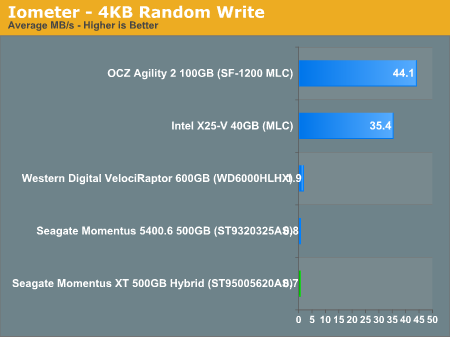Seagate's Momentus XT Reviewed, Finally a Good Hybrid HDD
by Anand Lal Shimpi on May 24, 2010 9:31 AM EST- Posted in
- Storage
- SSDs
- Seagate
- Momentus XT
- Hybrid Drive
- SSHDs
Sequential Read/Write Speed
Using the 6-22-2008 build of Iometer I ran a 3 minute long 2MB sequential test over the entire span of the drive. The results reported are in average MB/s over the entire test length:

Both sequential read and write speed are improved over the 5400.6 but we're still not in VelociRaptor territory. The X25-V is cripped in its write performance by comparison but most other SSDs do very well.

Random Read/Write Speed
This test reads/writes 4KB in a completely random pattern over an 8GB space of the drive to simulate the sort of random access that you'd see on an OS drive (even this is more stressful than a normal desktop user would see). I perform three concurrent IOs and run the test for 3 minutes. The results reported are in average MB/s over the entire time.

Random read/write performance is abysmal. You can't really make out the numbers here but that's 0.7MB/s for reads and 0.3MB/s for writes compared to 40MB/s+ for the SSDs. It's the poor random access performance that ultimately prevents the Momentus XT from feeling like an SSD most of the time.











120 Comments
View All Comments
leexgx - Monday, May 24, 2010 - link
vista and windows 7 make an cache file so when it boots up it loads it into ram so when the programs request it its all ready in ram, it norm frees up approx 400MB on my system once the desktop has shown for more then 20-30 secsthe above can only be done after the first boot has happened (so second and 3rd boot are norm better as it now has history and this fie is remade every boot so the flash is likely not been used as its an new file every boot up as it tweeks it every boot)
superfetch and this preboot in windows 7 would of messed some of these results up an little
DominionSeraph - Monday, May 24, 2010 - link
Sounds more like Windows' boot optimization to me. If that's still an idle task in Windows 7, perhaps the 5400RPM drive isn't being allowed to idle long enough to process the boot defrag?jimhsu - Monday, May 24, 2010 - link
I've said that the future usage scenario of SSDs, barring any dramatic price decreases, will probably be as cache. (For example, ZFS: http://iablog.sybase.com/paulley/2008/08/flash-ssd... and I'm pretty certain the other big file systems such as NTFS and ext will follow). And http://arstechnica.com/civis/viewtopic.php?f=15&am... . Do such "hybrid drives" offer better performance, better reliability, or any other advantage over filesystem-level caching techniques?nortexoid - Monday, May 24, 2010 - link
There's not much point in the synthetic benchmarks besides showing how the drive performs on applications that you're not running frequently--i.e. to compare the hdd-minus-the-4gb-flash-cache performance of the drive, basically.I'd say these hybrid drives are the best of both worlds and hence the best drives currently on the market. Capacity plus speed at "little" more than a standard magnetic drive. Awesome
KingofL337 - Monday, May 24, 2010 - link
I really wish they could have used 8-16GB of FLASH. 4GB isn't enough to really speed up everything you use allot on your computer to SSD speeds. I think for most people 8-16GB could definitely nail down the common stuff.What would be really sweet is if some company would make a hybrid drive controller that could take a SSD and HDD, then slave them together and make a hybrid system. Then I could select the size SSD and HDD based on my performance requirements.
Shadowmaster625 - Monday, May 24, 2010 - link
Seagate can only do what makes them money. If they sell a lot of these then the design team will be allowed to continue improving and exploring additional options. If they dont sell well, well...What I want is a flash cache that stores all my 4K random writes in flash, and also stores in flash any 4K cluster that I access frequently. 16GB 4 channel MLC would cost about the same as 1 channel of 4GB SLC. But they would need to add wear leveling.
leexgx - Monday, May 24, 2010 - link
the idea of the drive is so that the Most common read LBA blocks on the disk get cached into the flash, the drive does not care if the Read was an file or not as its only looking at what Part of the disk was read the most and puts that onto the flashquite an good idea really
arthur449 - Monday, May 24, 2010 - link
Silverstone has been selling a SSD+HDD device like you describe.http://silverstonetek.com/products/p_contents.php?...
It would be interesting to see how this SSD/HDD "do-it-yourself" hybrid fairs against The Mighty Anandtech Storage Benchmark, and, if pairing a fast SSD with a fast HDD, would give us a truly seamless best of both worlds experience.
shin0bi272 - Monday, May 24, 2010 - link
If you have a velociraptor dont bother with this and buy a standard SSD to boot from.piroroadkill - Monday, May 24, 2010 - link
You'll be announcing the Barracuda's with this, say, 2TB, with 8-16GB cache, anytime soon, right?